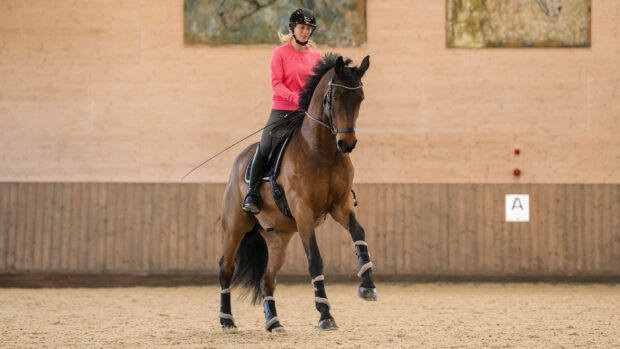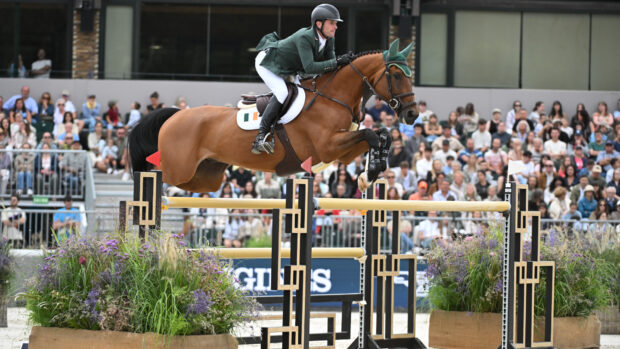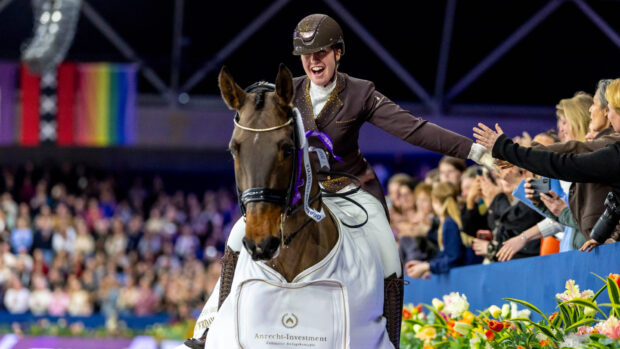How horses learn is integral to how we work with them. It is stating the obvious to say that we need to understand the processes through which horses learn to be able to train them effectively. Yet, multiple studies have shown that an understanding of the basic “nuts and bolts” of how horses learn is lacking in many professional and amateur equestrians alike.
Learning theory describes the processes through which horses learn, and is split into different levels of complexity. The first three levels are the most important for horse training:
You may be familiar with other words around this area of learning theory, such as desensitisation, sensitisation, imprinting, habituation, overshadowing and more. In this series, we’re going to look at each of these levels of learning theory, one by one, beginning with non-associative learning.
How horses learn: non-associative learning
When a horse encounters a stimulus repeatedly, they either habituate – that is, get used to it – or become sensitised, which is when they become more likely to react to it. What people often don’t realise is that which one occurs depends on the horse’s perception of the potential for it to cause them harm, not whether the threat is real or not.
{"content":"PGRpdiBpZD0iYXR0YWNobWVudF84ODcyOTYiIHN0eWxlPSJ3aWR0aDogMTQxMHB4IiBjbGFzcz0id3AtY2FwdGlvbiBhbGlnbm5vbmUiPjxpbWcgZmV0Y2hwcmlvcml0eT0iaGlnaCIgZGVjb2Rpbmc9ImFzeW5jIiBhcmlhLWRlc2NyaWJlZGJ5PSJjYXB0aW9uLWF0dGFjaG1lbnQtODg3Mjk2IiBjbGFzcz0ibGF6eWxvYWQgYmx1ci11cCBzaXplLWZ1bGwgd3AtaW1hZ2UtODg3Mjk2IiBkYXRhLXByb2Nlc3NlZCBzcmM9Imh0dHBzOi8va2V5YXNzZXRzLnRpbWVpbmN1ay5uZXQvaW5zcGlyZXdwL2xpdmUvd3AtY29udGVudC91cGxvYWRzL3NpdGVzLzE0LzIwMTcvMDMvbmV3LWhoLXBsYWNlaG9sZGVyLTIwMHgyMDAucG5nIiBkYXRhLXNyYz0iaHR0cHM6Ly9rZXlhc3NldHMudGltZWluY3VrLm5ldC9pbnNwaXJld3AvbGl2ZS93cC1jb250ZW50L3VwbG9hZHMvc2l0ZXMvMTQvMjAyNS8wMy9IUkpUN00uanBnIiBhbHQ9IkhvcnNlIHJpZGluZyBhbG9uZ3NpZGUgdHJhY3RvciIgd2lkdGg9IjE0MDAiIGhlaWdodD0iNzg4IiBkYXRhLXNpemVzPSJhdXRvIiBkYXRhLXNyY3NldD0iaHR0cHM6Ly9rZXlhc3NldHMudGltZWluY3VrLm5ldC9pbnNwaXJld3AvbGl2ZS93cC1jb250ZW50L3VwbG9hZHMvc2l0ZXMvMTQvMjAyNS8wMy9IUkpUN00uanBnIDE0MDB3LCBodHRwczovL2tleWFzc2V0cy50aW1laW5jdWsubmV0L2luc3BpcmV3cC9saXZlL3dwLWNvbnRlbnQvdXBsb2Fkcy9zaXRlcy8xNC8yMDI1LzAzL0hSSlQ3TS0zMDB4MTY5LmpwZyAzMDB3LCBodHRwczovL2tleWFzc2V0cy50aW1laW5jdWsubmV0L2luc3BpcmV3cC9saXZlL3dwLWNvbnRlbnQvdXBsb2Fkcy9zaXRlcy8xNC8yMDI1LzAzL0hSSlQ3TS02MzB4MzU1LmpwZyA2MzB3LCBodHRwczovL2tleWFzc2V0cy50aW1laW5jdWsubmV0L2luc3BpcmV3cC9saXZlL3dwLWNvbnRlbnQvdXBsb2Fkcy9zaXRlcy8xNC8yMDI1LzAzL0hSSlQ3TS0xMzV4NzYuanBnIDEzNXcsIGh0dHBzOi8va2V5YXNzZXRzLnRpbWVpbmN1ay5uZXQvaW5zcGlyZXdwL2xpdmUvd3AtY29udGVudC91cGxvYWRzL3NpdGVzLzE0LzIwMjUvMDMvSFJKVDdNLTMyMHgxODAuanBnIDMyMHcsIGh0dHBzOi8va2V5YXNzZXRzLnRpbWVpbmN1ay5uZXQvaW5zcGlyZXdwL2xpdmUvd3AtY29udGVudC91cGxvYWRzL3NpdGVzLzE0LzIwMjUvMDMvSFJKVDdNLTYyMHgzNDkuanBnIDYyMHcsIGh0dHBzOi8va2V5YXNzZXRzLnRpbWVpbmN1ay5uZXQvaW5zcGlyZXdwL2xpdmUvd3AtY29udGVudC91cGxvYWRzL3NpdGVzLzE0LzIwMjUvMDMvSFJKVDdNLTkyMHg1MTguanBnIDkyMHcsIGh0dHBzOi8va2V5YXNzZXRzLnRpbWVpbmN1ay5uZXQvaW5zcGlyZXdwL2xpdmUvd3AtY29udGVudC91cGxvYWRzL3NpdGVzLzE0LzIwMjUvMDMvSFJKVDdNLTEyMjB4Njg3LmpwZyAxMjIwdyIgc2l6ZXM9IihtYXgtd2lkdGg6IDE0MDBweCkgMTAwdncsIDE0MDBweCIgLz48cCBpZD0iY2FwdGlvbi1hdHRhY2htZW50LTg4NzI5NiIgY2xhc3M9IndwLWNhcHRpb24tdGV4dCI+V2hlbiBhIGhvcnNlIGJlY29tZXMgaGFiaXR1YXRlZCB0byBhIHBvdGVudGlhbCBkYW5nZXIgc3VjaCBhcyBhIG5vaXN5IHRyYWN0b3IsIHRoZXkgbGVhcm4gbm90IHRvIHJlYWN0IHRvIGl0LiBDcmVkaXQ6IEFsYW15PC9wPjwvZGl2Pgo8cD5UaGlzIG1pZ2h0IHNvdW5kIHNpbGx5IOKAkyBzdXJlbHkgYSBob3JzZSB3aWxsIGdldCB1c2VkIHRvIHRoaW5ncyB0aGF0IGRvbuKAmXQgaHVydCBpdD8gQnV0IGNvbnNpZGVyIGhvdyBtYW55IHBlb3BsZSBmZWFyIHNwaWRlcnMsIGFuZCBob3cgbWFueSBvZiB0aGVtIGhhdmUgYWN0dWFsbHkgYmVlbiBoYXJtZWQgYnkgb25lPyBSZWFsaXN0aWNhbGx5IHNwaWRlcnMgYXJlIG5vIHRocmVhdCB0byB1cyDigJMgYXQgbGVhc3QsIG5vdCBpbiB0aGUgVUsg4oCTIHlldCB0aGV5IHN0aWxsIGVsaWNpdCBhIGZlYXIgcmVzcG9uc2UgaW4gbWFueSBwZW9wbGUuIFRoZSBzaWdodCBvZiBhIHNwaWRlciB0cmlnZ2VycyBhIHJlYWN0aW9uIGluIHRoZSBhbXlnZGFsYSDigJMgdGhlIGZlYXIgY2VudHJlIGluIHRoZSBicmFpbiDigJMgYW5kIHRoaXMgbWVtb3J5IG9mIGZlYXIgaXMgdGhlbiBzdG9yZWQgZm9yIG5leHQgdGltZS48L3A+Cgo8cD5TbyB0aGUgbmV4dCB0aW1lIHlvdXIgaG9yc2UgaXMgc2NhcmVkIG9mIHNvbWV0aGluZyB5b3UgdGhpbmsgdGhleSBzaG91bGRu4oCZdCBiZSwgZG9u4oCZdCBnZXQgZnJ1c3RyYXRlZC4gSW5zdGVhZCBmb2N1cyBvbiB0cmFpbmluZyB0aGVtIHRvIGJlIGNvbmZpZGVudCBhbmQgeW91IHdpbGwgZmluZCB0aGV5IGdldCBicmF2ZXIgb3ZlciB0aW1lLiBJbiBmdXR1cmUgYXJ0aWNsZXMgd2Ugd2lsbCBhZGRyZXNzIGhvdyB0byBkbyB0aGlzLjwvcD4KPHA+PGRpdiBpZD0iYXR0YWNobWVudF84ODcyOTQiIHN0eWxlPSJ3aWR0aDogMTQxMHB4IiBjbGFzcz0id3AtY2FwdGlvbiBhbGlnbm5vbmUiPjxpbWcgZGVjb2Rpbmc9ImFzeW5jIiBhcmlhLWRlc2NyaWJlZGJ5PSJjYXB0aW9uLWF0dGFjaG1lbnQtODg3Mjk0IiBjbGFzcz0ibGF6eWxvYWQgYmx1ci11cCBzaXplLWZ1bGwgd3AtaW1hZ2UtODg3Mjk0IiBkYXRhLXByb2Nlc3NlZCBzcmM9Imh0dHBzOi8va2V5YXNzZXRzLnRpbWVpbmN1ay5uZXQvaW5zcGlyZXdwL2xpdmUvd3AtY29udGVudC91cGxvYWRzL3NpdGVzLzE0LzIwMTcvMDMvbmV3LWhoLXBsYWNlaG9sZGVyLTIwMHgyMDAucG5nIiBkYXRhLXNyYz0iaHR0cHM6Ly9rZXlhc3NldHMudGltZWluY3VrLm5ldC9pbnNwaXJld3AvbGl2ZS93cC1jb250ZW50L3VwbG9hZHMvc2l0ZXMvMTQvMjAyNS8wMy9IQUgwMC5sYl9KZXNzVGFsYm90X1BCLkplc3NUYWxib3RfSW5UaGVTY2hvb2xfMjIwLmpwZyIgYWx0PSJVbmRlcnN0YW5kaW5nIGhvdyBob3JzZXMgbGVhcm46IHRyYWluaW5nIGEgaG9yc2UgdG8gZ2V0IHVzZWQgdG8gYSBoYXphcmQuIiB3aWR0aD0iMTQwMCIgaGVpZ2h0PSI4NzkiIGRhdGEtc2l6ZXM9ImF1dG8iIGRhdGEtc3Jjc2V0PSJodHRwczovL2tleWFzc2V0cy50aW1laW5jdWsubmV0L2luc3BpcmV3cC9saXZlL3dwLWNvbnRlbnQvdXBsb2Fkcy9zaXRlcy8xNC8yMDI1LzAzL0hBSDAwLmxiX0plc3NUYWxib3RfUEIuSmVzc1RhbGJvdF9JblRoZVNjaG9vbF8yMjAuanBnIDE0MDB3LCBodHRwczovL2tleWFzc2V0cy50aW1laW5jdWsubmV0L2luc3BpcmV3cC9saXZlL3dwLWNvbnRlbnQvdXBsb2Fkcy9zaXRlcy8xNC8yMDI1LzAzL0hBSDAwLmxiX0plc3NUYWxib3RfUEIuSmVzc1RhbGJvdF9JblRoZVNjaG9vbF8yMjAtMzAweDE4OC5qcGcgMzAwdywgaHR0cHM6Ly9rZXlhc3NldHMudGltZWluY3VrLm5ldC9pbnNwaXJld3AvbGl2ZS93cC1jb250ZW50L3VwbG9hZHMvc2l0ZXMvMTQvMjAyNS8wMy9IQUgwMC5sYl9KZXNzVGFsYm90X1BCLkplc3NUYWxib3RfSW5UaGVTY2hvb2xfMjIwLTYzMHgzOTYuanBnIDYzMHcsIGh0dHBzOi8va2V5YXNzZXRzLnRpbWVpbmN1ay5uZXQvaW5zcGlyZXdwL2xpdmUvd3AtY29udGVudC91cGxvYWRzL3NpdGVzLzE0LzIwMjUvMDMvSEFIMDAubGJfSmVzc1RhbGJvdF9QQi5KZXNzVGFsYm90X0luVGhlU2Nob29sXzIyMC0xMzV4ODUuanBnIDEzNXcsIGh0dHBzOi8va2V5YXNzZXRzLnRpbWVpbmN1ay5uZXQvaW5zcGlyZXdwL2xpdmUvd3AtY29udGVudC91cGxvYWRzL3NpdGVzLzE0LzIwMjUvMDMvSEFIMDAubGJfSmVzc1RhbGJvdF9QQi5KZXNzVGFsYm90X0luVGhlU2Nob29sXzIyMC0zMjB4MjAxLmpwZyAzMjB3LCBodHRwczovL2tleWFzc2V0cy50aW1laW5jdWsubmV0L2luc3BpcmV3cC9saXZlL3dwLWNvbnRlbnQvdXBsb2Fkcy9zaXRlcy8xNC8yMDI1LzAzL0hBSDAwLmxiX0plc3NUYWxib3RfUEIuSmVzc1RhbGJvdF9JblRoZVNjaG9vbF8yMjAtNjIweDM4OS5qcGcgNjIwdywgaHR0cHM6Ly9rZXlhc3NldHMudGltZWluY3VrLm5ldC9pbnNwaXJld3AvbGl2ZS93cC1jb250ZW50L3VwbG9hZHMvc2l0ZXMvMTQvMjAyNS8wMy9IQUgwMC5sYl9KZXNzVGFsYm90X1BCLkplc3NUYWxib3RfSW5UaGVTY2hvb2xfMjIwLTkyMHg1NzguanBnIDkyMHcsIGh0dHBzOi8va2V5YXNzZXRzLnRpbWVpbmN1ay5uZXQvaW5zcGlyZXdwL2xpdmUvd3AtY29udGVudC91cGxvYWRzL3NpdGVzLzE0LzIwMjUvMDMvSEFIMDAubGJfSmVzc1RhbGJvdF9QQi5KZXNzVGFsYm90X0luVGhlU2Nob29sXzIyMC0xMjIweDc2Ni5qcGcgMTIyMHciIHNpemVzPSIobWF4LXdpZHRoOiAxNDAwcHgpIDEwMHZ3LCAxNDAwcHgiIC8+PHAgaWQ9ImNhcHRpb24tYXR0YWNobWVudC04ODcyOTQiIGNsYXNzPSJ3cC1jYXB0aW9uLXRleHQiPkhhYml0dWF0aW9uIHRha2VzIHRpbWUgYW5kIHBhdGllbmNlLCBhcyB0aGUgaG9yc2UgZGV2ZWxvcHMgY29uZmlkZW5jZSB0aGF0IGEgcGVyY2VpdmVkIHRocmVhdCBpcyBub3QgZ29pbmcgdG8gaGFybSB0aGVtLiBDcmVkaXQ6IFBoaWxpcCBCYXJrZXI8L3A+PC9kaXY+PGJyIC8+CjwvcD4KPGgyPkEgY29tcGxleCBiYWxhbmNlIG9mIGhhYml0dWF0aW9uIGFuZCBzZW5zaXRpc2F0aW9uPC9oMj4KPHA+Qm90aCBzZW5zaXRpc2F0aW9uIGFuZCBoYWJpdHVhdGlvbiBhcmUgaW1wb3J0YW50IHdoZW4gdHJhaW5pbmcgaG9yc2VzLiBDb25zaWRlciB0aGF0IHdlIGV4cGVjdCBob3JzZXMgdG8gaGFiaXR1YXRlIHRvIGNvbnRhY3QgdmlhIHRoZSBiaXQsIG9yIGEgcmlkZXLigJlzIGxlZyBhZ2FpbnN0IHRoZWlyIHNpZGVzLiBZZXQgYXQgdGhlIHNhbWUgdGltZSB3ZSBleHBlY3QgdGhlbSB0byBiZSBzZW5zaXRpdmUgdG8gYW4gYWlkIGFuZCByZXNwb25kIGltbWVkaWF0ZWx5IOKAkyB0aGUgb25seSBkaWZmZXJlbmNlIGlzIHRoZSBhbW91bnQgb2YgcHJlc3N1cmUgYW5kIHRoZSBkaXJlY3Rpb24gaW4gd2hpY2ggaXQgaXMgYXBwbGllZC48L3A+Cgo8cD5UaGlzIGtub3dsZWRnZSBzaG91bGQgbW90aXZhdGUgcmlkZXJzIGFsd2F5cyB0byB3b3JrIG9uIGhhdmluZyBhbiBpbmRlcGVuZGVudCBzZWF0LCB0byBhbGxvdyBhIGNsZWFyIGRpZmZlcmVudGlhdGlvbiBiZXR3ZWVuIGxpZ2h0IGFuZCBjb25zaXN0ZW50IGNvbnRhY3QgdmVyc3VzIGFuIGFpZC4gSW4gY29udHJhc3QgdGhlIG1vcmUgbm92aWNlIHJpZGVyIG1heSBzb21ldGltZXMgYmUgdXNpbmcgdGhlIGhhbmQgb3IgbGVnIGFzIGFuIGFpZCwgYW5kIG90aGVyIHRpbWVzIHRoZSBzYW1lIGFtb3VudCBvZiBwcmVzc3VyZSBpcyBhcHBsaWVkIGJlY2F1c2UgdGhleSBsb3N0IHRoZWlyIGJhbGFuY2Ug4oCTIG5vIHdvbmRlciBzb21lIGhvcnNlcyBiZWNvbWUgY29uZnVzZWQuPC9wPgo8cD5TaW1pbGFybHksIHdlIGV4cGVjdCBzaG93anVtcGVycyB0byBoYWJpdHVhdGUgdG8gYWxsIHRoZSBzZW5zb3J5IGluZm9ybWF0aW9uIHRoZXkgbWlnaHQgYmUgZXhwb3NlZCB0byBhdCBhbiBpbnRlcm5hdGlvbmFsIHNob3csIGluY2x1ZGluZyDigJxzcG9va3nigJ0gZmVuY2VzLCB5ZXQgYXQgdGhlIHNhbWUgdGltZSByZW1haW4gcmVhY3RpdmUgZW5vdWdoIHRvIGJlY29tZSBzZW5zaXRpc2VkIGlmIHRoZXkgdG91Y2ggYSBwb2xlLjwvcD4KPGRpdiBjbGFzcz0iaW5qZWN0aW9uIj48L2Rpdj4KPGRpdiBpZD0iYXR0YWNobWVudF84ODcyOTMiIHN0eWxlPSJ3aWR0aDogMTQxMHB4IiBjbGFzcz0id3AtY2FwdGlvbiBhbGlnbm5vbmUiPjxpbWcgZGVjb2Rpbmc9ImFzeW5jIiBhcmlhLWRlc2NyaWJlZGJ5PSJjYXB0aW9uLWF0dGFjaG1lbnQtODg3MjkzIiBjbGFzcz0ibGF6eWxvYWQgYmx1ci11cCBzaXplLWZ1bGwgd3AtaW1hZ2UtODg3MjkzIiBkYXRhLXByb2Nlc3NlZCBzcmM9Imh0dHBzOi8va2V5YXNzZXRzLnRpbWVpbmN1ay5uZXQvaW5zcGlyZXdwL2xpdmUvd3AtY29udGVudC91cGxvYWRzL3NpdGVzLzE0LzIwMTcvMDMvbmV3LWhoLXBsYWNlaG9sZGVyLTIwMHgyMDAucG5nIiBkYXRhLXNyYz0iaHR0cHM6Ly9rZXlhc3NldHMudGltZWluY3VrLm5ldC9pbnNwaXJld3AvbGl2ZS93cC1jb250ZW50L3VwbG9hZHMvc2l0ZXMvMTQvMjAyNS8wMy8yWE5KTjRDLmpwZyIgYWx0PSJDaHJpc3RpYW4gS3VrdWssIFBhcmlzIE9seW1waWMgY2hhbXBpb24gaW4gZnJvbnQgb2YgaHVnZSBjcm93ZCIgd2lkdGg9IjE0MDAiIGhlaWdodD0iNzg4IiBkYXRhLXNpemVzPSJhdXRvIiBkYXRhLXNyY3NldD0iaHR0cHM6Ly9rZXlhc3NldHMudGltZWluY3VrLm5ldC9pbnNwaXJld3AvbGl2ZS93cC1jb250ZW50L3VwbG9hZHMvc2l0ZXMvMTQvMjAyNS8wMy8yWE5KTjRDLmpwZyAxNDAwdywgaHR0cHM6Ly9rZXlhc3NldHMudGltZWluY3VrLm5ldC9pbnNwaXJld3AvbGl2ZS93cC1jb250ZW50L3VwbG9hZHMvc2l0ZXMvMTQvMjAyNS8wMy8yWE5KTjRDLTMwMHgxNjkuanBnIDMwMHcsIGh0dHBzOi8va2V5YXNzZXRzLnRpbWVpbmN1ay5uZXQvaW5zcGlyZXdwL2xpdmUvd3AtY29udGVudC91cGxvYWRzL3NpdGVzLzE0LzIwMjUvMDMvMlhOSk40Qy02MzB4MzU1LmpwZyA2MzB3LCBodHRwczovL2tleWFzc2V0cy50aW1laW5jdWsubmV0L2luc3BpcmV3cC9saXZlL3dwLWNvbnRlbnQvdXBsb2Fkcy9zaXRlcy8xNC8yMDI1LzAzLzJYTkpONEMtMTM1eDc2LmpwZyAxMzV3LCBodHRwczovL2tleWFzc2V0cy50aW1laW5jdWsubmV0L2luc3BpcmV3cC9saXZlL3dwLWNvbnRlbnQvdXBsb2Fkcy9zaXRlcy8xNC8yMDI1LzAzLzJYTkpONEMtMzIweDE4MC5qcGcgMzIwdywgaHR0cHM6Ly9rZXlhc3NldHMudGltZWluY3VrLm5ldC9pbnNwaXJld3AvbGl2ZS93cC1jb250ZW50L3VwbG9hZHMvc2l0ZXMvMTQvMjAyNS8wMy8yWE5KTjRDLTYyMHgzNDkuanBnIDYyMHcsIGh0dHBzOi8va2V5YXNzZXRzLnRpbWVpbmN1ay5uZXQvaW5zcGlyZXdwL2xpdmUvd3AtY29udGVudC91cGxvYWRzL3NpdGVzLzE0LzIwMjUvMDMvMlhOSk40Qy05MjB4NTE4LmpwZyA5MjB3LCBodHRwczovL2tleWFzc2V0cy50aW1laW5jdWsubmV0L2luc3BpcmV3cC9saXZlL3dwLWNvbnRlbnQvdXBsb2Fkcy9zaXRlcy8xNC8yMDI1LzAzLzJYTkpONEMtMTIyMHg2ODcuanBnIDEyMjB3IiBzaXplcz0iKG1heC13aWR0aDogMTQwMHB4KSAxMDB2dywgMTQwMHB4IiAvPjxwIGlkPSJjYXB0aW9uLWF0dGFjaG1lbnQtODg3MjkzIiBjbGFzcz0id3AtY2FwdGlvbi10ZXh0Ij5BdCBlbGl0ZSBsZXZlbCwgdG9wIHNob3dqdW1wZXJzIGFyZSBib3RoIGhhYml0dWF0ZWQgdG8gdGhlIGRpc3RyYWN0aW9ucyBvZiB0aGUgY3Jvd2QgYXRtb3NwaGVyZSwgd2hpbGUgcmVtYWluaW5nIHNlbnNpdGl2ZSB0byB0aGVpciByaWRlcuKAmXMgYWlkcyBhbmQgcmV0YWluaW5nIHRoZWlyIGRlc2lyZSBub3QgdG8gdG91Y2ggdGhlIHBvbGVzLiBDcmVkaXQ6IEFsYW15PC9wPjwvZGl2Pgo8cD5PdXIgam9iIGlzIHRvIGhlbHAgdGhlIGhvcnNlIGFzc2VzcyBhbmQgYmFsYW5jZSB0aG9zZSBkZW1hbmRzLiBBZ2FpbiwgdW5kZXJzdGFuZGluZyB0cmFpbmluZyBpbiBtb3JlIGRlcHRoIGlzIGltcG9ydGFudCB0byBuYXZpZ2F0ZSB0aGlzIGNvbXBsZXhpdHkuPC9wPgo8cD4K"}
You may also be interested to read…
Getting inside a horse’s mind is vital for training them effectively.
Credit: Emma Herrod Photography
Understanding how horses learn can help to you to build a bond with your horse.
Credit: Alamy Stock Photo
Corach Rambler (purple and yellow silks) en-route to winning in 2023.
Credit: Alamy Live News.
When dealing with nappy horses, it’s important to spend time training the horse to go forward from a leg cue – but don’t nag with the leg and teach the horse to ignore it.
Credit: Emma Herrod
Credit: Nottingham Trent University
Library image.
Credit: Alamy Stock Photo
Stay in touch with all the news in the run-up to and throughout the major shows and events during 2026 and beyond with a Horse & Hound subscription. Subscribe today for all you need to know ahead of these major events, plus online reports on the action as it happens from our expert team of reporters and in-depth analysis in our special commemorative magazines. Have a subscription already? Set up your unlimited website access now









